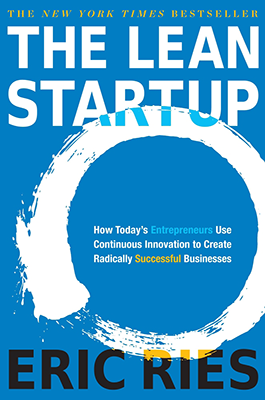The Lean Startup
“The Lean Startup” by Eric Ries is a seminal book in the field of entrepreneurship and business strategy, outlining principles and practices for building successful startups in an uncertain and rapidly changing environment. Here’s a summary:
Build-Measure-Learn: The core concept of the Lean Startup methodology is the Build-Measure-Learn feedback loop. Instead of spending months or years developing a product without customer feedback, startups should build a minimum viable product (MVP), measure its performance using key metrics, and learn from the data to make informed decisions about future iterations.
Validated Learning: The goal of the Lean Startup is to achieve validated learning – that is, to validate or invalidate key assumptions about the business model as quickly and cheaply as possible. Startups should focus on testing hypotheses through experiments and gathering data to inform their next steps.
Minimum Viable Product (MVP): An MVP is the simplest version of a product that allows startups to test their hypotheses and gather feedback from early customers. The emphasis is on delivering core value to customers with minimal features, allowing startups to iterate and pivot based on feedback.
Pivot and Persevere: The Lean Startup encourages startups to be flexible and adaptable in response to new information. If initial assumptions are proven wrong, startups should be willing to pivot – that is, change their strategy or direction based on what they’ve learned. However, if they’re making progress towards their vision, they should persevere and double down on what’s working.
The Three Engines of Growth: Ries identifies three engines of growth for startups: sticky, viral, and paid. Sticky growth comes from retaining existing customers, viral growth comes from customers referring others to the product, and paid growth comes from acquiring new customers through advertising or other paid channels. Startups should focus on optimizing these engines of growth to scale their business.
Innovation Accounting: Traditional financial metrics are not always useful for startups in the early stages. Instead, startups should use innovation accounting – a set of metrics and frameworks for measuring progress and validating learning. This includes metrics like the rate of validated learning, the speed of iterations, and the cost of acquiring customers.
Continuous Deployment: The Lean Startup advocates for a culture of continuous deployment, where startups release new features and updates to their product as soon as they’re ready, rather than waiting for a big launch. This allows startups to gather feedback quickly and respond to customer needs in real-time.
Overall, “The Lean Startup” provides a framework for building and growing startups in a fast-paced and uncertain world. By focusing on validated learning, iterative experimentation, and customer feedback, startups can increase their chances of success and build sustainable businesses.

